The Most Sublime Porte - An Ottoman AAR
- Thread starter Riotkiller
- Start date
-
We have updated our Community Code of Conduct. Please read through the new rules for the forum that are an integral part of Paradox Interactive’s User Agreement.
You are using an out of date browser. It may not display this or other websites correctly.
You should upgrade or use an alternative browser.
You should upgrade or use an alternative browser.
Threadmarks
View all 63 threadmarks
Reader mode
Reader mode
Recent threadmarks
Chapter Fifty-Four: New Challenges (1928-1929) Chapter Fifty-Five: The Ottoman Golden Age (1930-1934) Chapter Fifty-Six: Scandal and Conflict (1934-1937) Chapter Fifty-Seven: The Caucasian War (Part I) Chapter Fifty-Eight: The Caucasian War (Part II) Chapter Fifty-Nine: The End of an Era (1938-1940) Chapter Sixty: The Bulldog Imperilled (1939-1943) Chapter Sixty-One: Troublesome Greeks (1943-1945)Riotkiller - Firstly I just have to mention your complaints about the British cold snap a few days ago. It made me smile because last year I emigrated to the Russian Federation from the UK and it has been a very cold winter. There has been snow every day since December, temperatures plummeted in January to -20c and only in February has it started to return to a nice warm 0c. As my wife told me it's been a very good winter for Russia this year. So when I hear you and others back in the UK talking about cold snaps, I just smile and think Britain really can't cope with the cold, heh. Still hope you are ok and are feeling better my good man. I was missing your updates alot and it is good to see you back in action with quality updates.
Anyway my own thoughts are as follows. It seems the Ottoman-Persian war had effects demographically speaking to a mini great war especially considering the total war effect it had on the nation. With such recent losses, I dread to think how the Ottoman Empire is going to cope in this big war after all is said and done.
Looking at present situation, I think that Spain has held out surprisingly well. I was expecting them to capitualite but they are holding in there. Let's hope the Americans can rush forces to Spain in order to turn the tide. Either that or a nice big fat American landing in France itself would be nice.
Your military situation looks horrible if I am honest. Have you mobilised the entire population yet? I hope mobilisation can help turn the tide. Brits will be difficult to dislodge but so here's hoping they burn out from attrition until you can strike. Germany seems fine though as does Italy.
I did want to ask but what is the tech level for this GW? Are the main combatants using bolt action rifles and heavily artillery or are we at single shot rifles and cannons?
Anyway keep up the writing my good man. Looking forward to more.
Anyway my own thoughts are as follows. It seems the Ottoman-Persian war had effects demographically speaking to a mini great war especially considering the total war effect it had on the nation. With such recent losses, I dread to think how the Ottoman Empire is going to cope in this big war after all is said and done.
Looking at present situation, I think that Spain has held out surprisingly well. I was expecting them to capitualite but they are holding in there. Let's hope the Americans can rush forces to Spain in order to turn the tide. Either that or a nice big fat American landing in France itself would be nice.
Your military situation looks horrible if I am honest. Have you mobilised the entire population yet? I hope mobilisation can help turn the tide. Brits will be difficult to dislodge but so here's hoping they burn out from attrition until you can strike. Germany seems fine though as does Italy.
I did want to ask but what is the tech level for this GW? Are the main combatants using bolt action rifles and heavily artillery or are we at single shot rifles and cannons?
Anyway keep up the writing my good man. Looking forward to more.
Yes, the Arab Revolt spawns agitation modifiers in provinces periodically, but it can end when there are none remaining, at which point the Mashriqi can be re-embraced.Germany seems far more capable at diplomacy than OTL. The Ottomans have chosen a very capable ally it seems. The only problem now becomes that they need to keep their own in a fight if they wish to keep their massive realm together.
As a side-note, is there any way of reintegrating the Masqiri population of the Empire? That Great Arab Revolt event makes choosing the Bulgarians over the Arabs a very clear choice
Yeah, the Italian intervention in particular offered some very welcome relief by drawing French forces away from Spain and Morocco.Those were bloody terrible defeats. Thank heavens for new allies otherwise things would be very grim indeed.
Oh snap.
The industrial capacity of the Americans could well become vital for our future success in the war, it is true!Some early disasters in the beginning there, but it appears as though things have stabilized for the time being, which may afford the Allies some breathing room. That, and the new Allies -- the Italians and especially the Americans -- should hopefully allow the Alliance to turn the tide.
Thank you, I'm glad you're enjoying it!Just found this AAR this past weekend and have now caught up. One of the best I've read it some time. Great success so far with a country that's a rarity in AAR world.
Now that the Italians and Americans have joined here's hoping we can prevail in the Great War!
Aha, yes I have no doubt that it is far colder elsewhere, but it's for reasons like that why I would never move to somewhere experiencing true Siberian weather frontsRiotkiller - Firstly I just have to mention your complaints about the British cold snap a few days ago. It made me smile because last year I emigrated to the Russian Federation from the UK and it has been a very cold winter. There has been snow every day since December, temperatures plummeted in January to -20c and only in February has it started to return to a nice warm 0c. As my wife told me it's been a very good winter for Russia this year. So when I hear you and others back in the UK talking about cold snaps, I just smile and think Britain really can't cope with the cold, heh. Still hope you are ok and are feeling better my good man. I was missing your updates alot and it is good to see you back in action with quality updates.
Anyway my own thoughts are as follows. It seems the Ottoman-Persian war had effects demographically speaking to a mini great war especially considering the total war effect it had on the nation. With such recent losses, I dread to think how the Ottoman Empire is going to cope in this big war after all is said and done.
Looking at present situation, I think that Spain has held out surprisingly well. I was expecting them to capitualite but they are holding in there. Let's hope the Americans can rush forces to Spain in order to turn the tide. Either that or a nice big fat American landing in France itself would be nice.
Your military situation looks horrible if I am honest. Have you mobilised the entire population yet? I hope mobilisation can help turn the tide. Brits will be difficult to dislodge but so here's hoping they burn out from attrition until you can strike. Germany seems fine though as does Italy.
I did want to ask but what is the tech level for this GW? Are the main combatants using bolt action rifles and heavily artillery or are we at single shot rifles and cannons?
Anyway keep up the writing my good man. Looking forward to more.
Manpower levels were certainly hurt by the Ottoman-Persian War and of course the Great War is cutting deeper still. The Empire mobilised at the very start of the war, and the mobilised reserves have generally been fed into the pre-existing armies to make up for losses suffered in battle - though that's mostly happened on the Fronts closer to home.
The Spanish have certainly had a very tough time of it, but they seem to perform very well in combat so when they aren't horrendously outnumbered they've managed to check the Entente forces on numerous occasions. With the loss of the Ottoman armies in Morocco then an American landing in Spain really is their best hope if the war continues to drag on though, that's for sure.
Bolt action rifles are indeed the standard weaponry of the Great Powers, with heavy artillery and machine guns providing the support. There are many new innovations that are being made as the war goes on, with our German allies in particular having developed some very impressive howitzers and mortars that we are yet to perfect ourselves.
Chapter Forty-One: The Eastern Theatres of the Great War (1905)
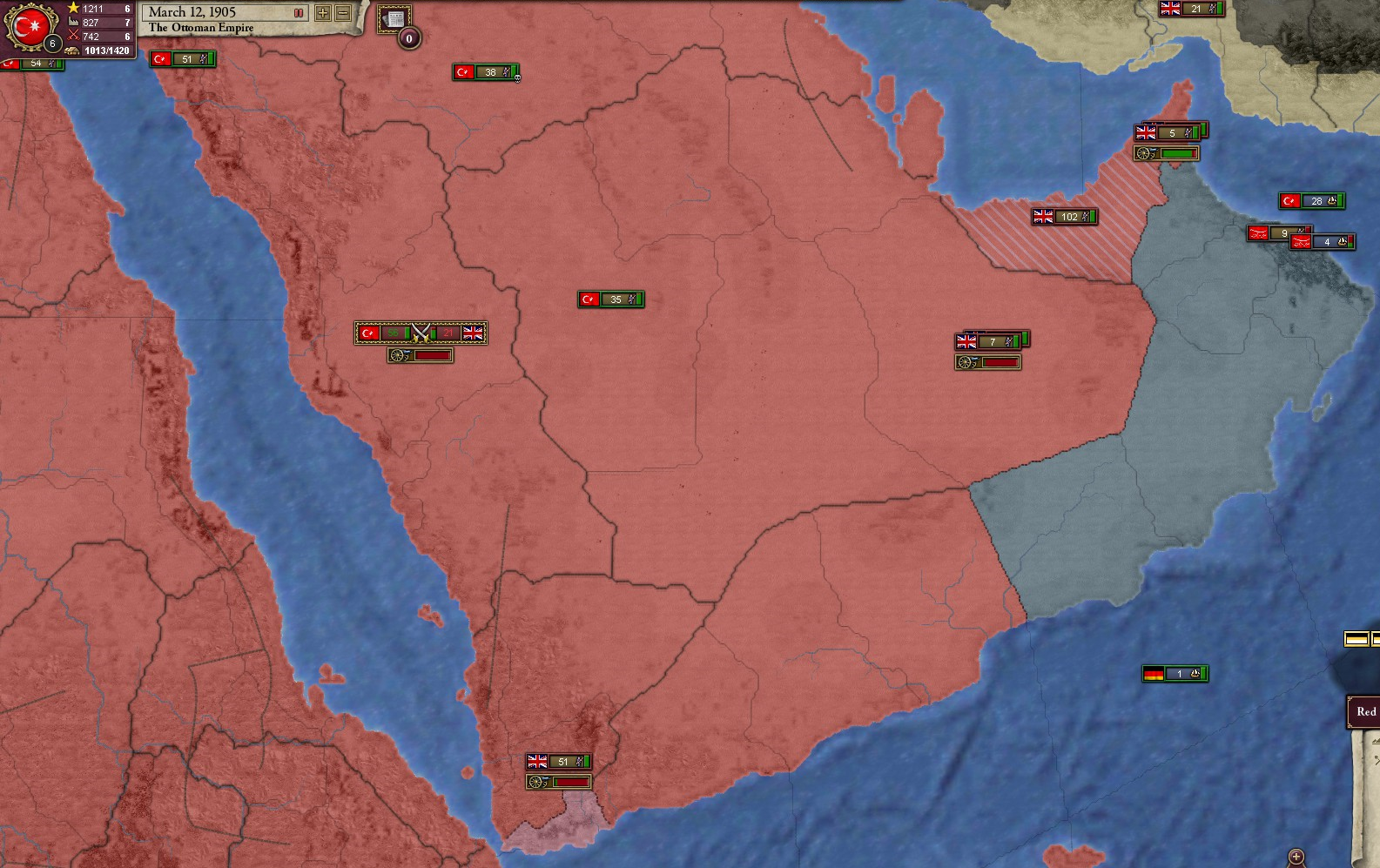
The Arabian Front and the Battle of Mecca in March 1905
Due to the immense scope of the Great War, it is almost impossible to report on all its many great battles concurrently and do the great tragedy justice. As such, these chapter will be divided into the “Western” and “Eastern” Theatres, with each containing a significant number of fronts, and the chapter focusing solely on events taking place in those theatres. The Eastern Theatres of the war as such contain the Eastern Front, the Bessarabian Front, the Caucasian Front, the Arabian Front, and the East African Front, as well as four minor fronts which opened up during 1905. These theatres were chiefly an assortment of Alliance Members fighting against the Russian Empire or the United Kingdom, with occasional support from the minor Entente powers.
As 1905 began, the Ottoman Empire found itself facing the new threat of the British landings in Arabia and the steadily increasing horde of British troops that had crossed the Straits of Hormuz into Ottoman territories. This front would eventually require the assignment of all five uncommitted Ottoman armies, as the armies of the Sudan, Abyssinia, and Cyrenaica were sent to join the armies of Arabia and of the Trucial States that were already in the region. All of these armies were made up of the less reliable colonial troops, and so numerical superiority was quickly identified as being key for going toe-to-toe with the best armies of British India.
The Arabian Front, like the other Eastern Theatres, had very little of the Trench Warfare that characterised much of the fighting in the Western Theatres. Here the war was one of movement, and harsh conditions of the Arabian Desert would test both forces to the limit. For the British, their invasion of Arabia sought to capitalise on the ongoing Arab Revolt. The British did not initially expect much resistance from the Ottoman Empire, and they hoped that if the Arabs would rise up alongside them, they could advance toward their true strategic goal of the invasion: Suez. If the Brits could secure the Canal, the Royal Navy would be able to give the Entente full naval superiority in the Mediterranean and potentially allow them to try and force the Dardanelles to provide support to their Russian allies.
The Sublime Porte, for its part, was determined not to let the Brits anywhere near Suez. As such, initial proposals to fall back out of Arabia to Mesopotamia and the Levant were quickly turned down, and a new Ottoman strategy of hit-and-run tactics was embraced. Ottoman forces were sent to the Peninsula but only to engage detached British forces where we could gain local superiority, with the aim of slowing the British advance to a crawl. Engagements with British troops which outnumbered our own would be avoided where possible. The first test of this came at Halaban in the deserts of Nejd, where a British corps of 6000 men was surprised and captured by the Army of Arabia in February 1905. The British had scrambled reinforcements upon hearing of the engagement, but British forces under General Alfred Battemberg suffered a second defeat at Halaban at the end of the month, despite briefly outnumbering our forces.
By attempting to relieve the initial corps, Battemberg’s Army had itself become extremely detached from the rest of the British forces, which for the most part were still in the Trucial States, apart from another British army which was liberating the city of Aden. Furthermore, Battemberg’s Army had become very disorganised in its retreat and lost its way in the desert, instead finding themselves retreating deeper into Ottoman territory as they entered the eyalet of Mecca. With the Holy City itself threatened, Sultan Abdulhamid II now made a personal intervention in the war to declare a Jihad against the Entente, calling upon all Muslims to put aside their differences and defend the holy cities.
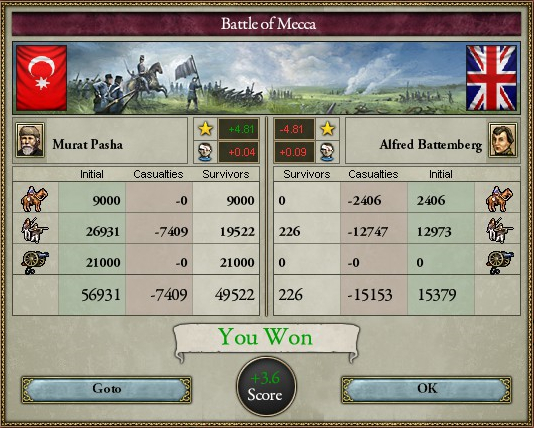
The Battle of Mecca saw off the Entente threat to the Holy City (March 1905)
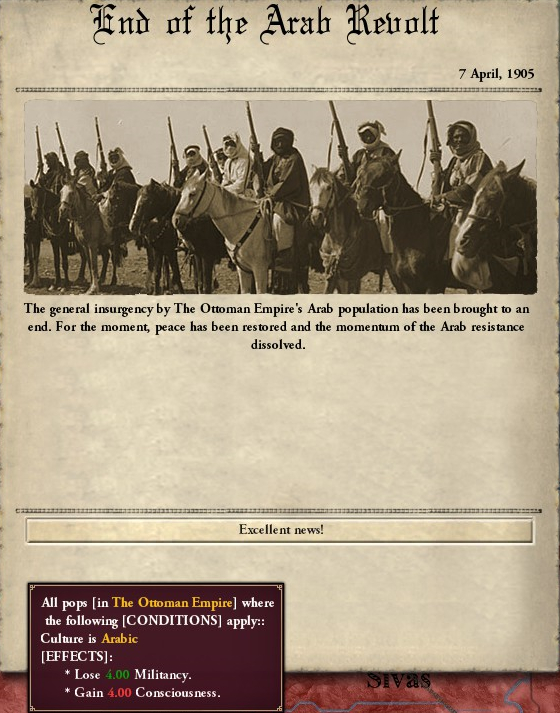
The British attack on Mecca, combined with the Sultan's call for Jihad, saw Arab Leaders end the Arab Revolt in April 1905
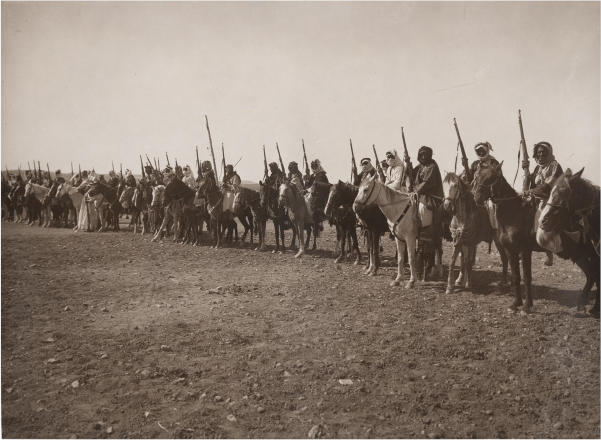
Arab tribal leaders gather to begin the Jihad and defend Arabia (April 1905)
The Sultan’s designation of the Great War as a Jihad, combined with Battemberg’s force making an ill-advised attempt to capture Mecca in March 1905, helped to heal the wounds caused by the Arab Revolt and turned the Mashriqi and Bedouin Arabs decisively against the invading British forces – much to the surprise of London. Meanwhile Murat Pasha’s Army of Abyssinia had hurried to defend Mecca, and with great help from the local tribes a huge victory was won, with Battemberg’s force being entirely wiped out by the end of the March, and Battemberg himself captured. His vain dreams of bringing glory to the British Empire by capturing Mecca had united the Ottoman population in a way that the Sublime Porte had not been able to do in years, and in April 1905 the Arab Revolt was officially ended as a result. Outraged tribal leaders had met with representatives of the Porte and agreed to heed the call to Jihad and accept the olive branch offered by Grand Vizier Hilmi Pasha.
Meanwhile in Europe, Ottoman forces on the Bessarabian Front continued to advance into Russian territory, with the city of Odessa falling in January 1905, and a Russian army annihilated at Proskorov in March. By April, Ottoman forces had reached the River Dnieper and were threatening the city of Kiev itself, while a Russian counter-attack had been defeated at Odessa and the Army of Egypt had secured control of most of the Crimean Peninsula. In the Caucasus too, the entirety of Georgia had now been occupied by Ottoman forces with only Tbilisi holding out by the end of March, although a new Russian army had invaded Ottoman Azerbaijan, where the Russian suffered another catastrophic defeat at the Second Battle of Sheki in April. Pertev Pasha’s Army of Syria then pursued the Russians and forced the surrender of that entire Russian invasion force at Derbent.
Simultaneously, the Eastern Theatres saw two new fronts open up in early 1905. Firstly the British allies in the Kingdom of Greece joined the Entente on March 25th, opening a new front against the Ottoman Empire while our forces were heavily committed against the Russians. And secondly, at the same time, the Empire of Japan officially joined the Alliance and began an invasion of Korea and the Russian Far East. These new fronts were joined by more British forces marching through the supposedly-neutral Persia to directly attack Mesopotamia, where they suffered a defeat at the Battle of Basra in late April but instantly withdrew back over the border. While this frustration saw yet more protests by Ottoman diplomats in Tehran, the Porte was not too disappointed by the splitting of British forces as it left them more vulnerable in Arabia. As a result the Ottoman Indian Ocean Fleet sallied forth from Kuwait in May and defeated a flotilla of outdated ships from British India that had been helping to supply the British in Arabia, and now began a campaign of raiding that made the chance of further British crossings of the Straits of Hormuz very unlikely.
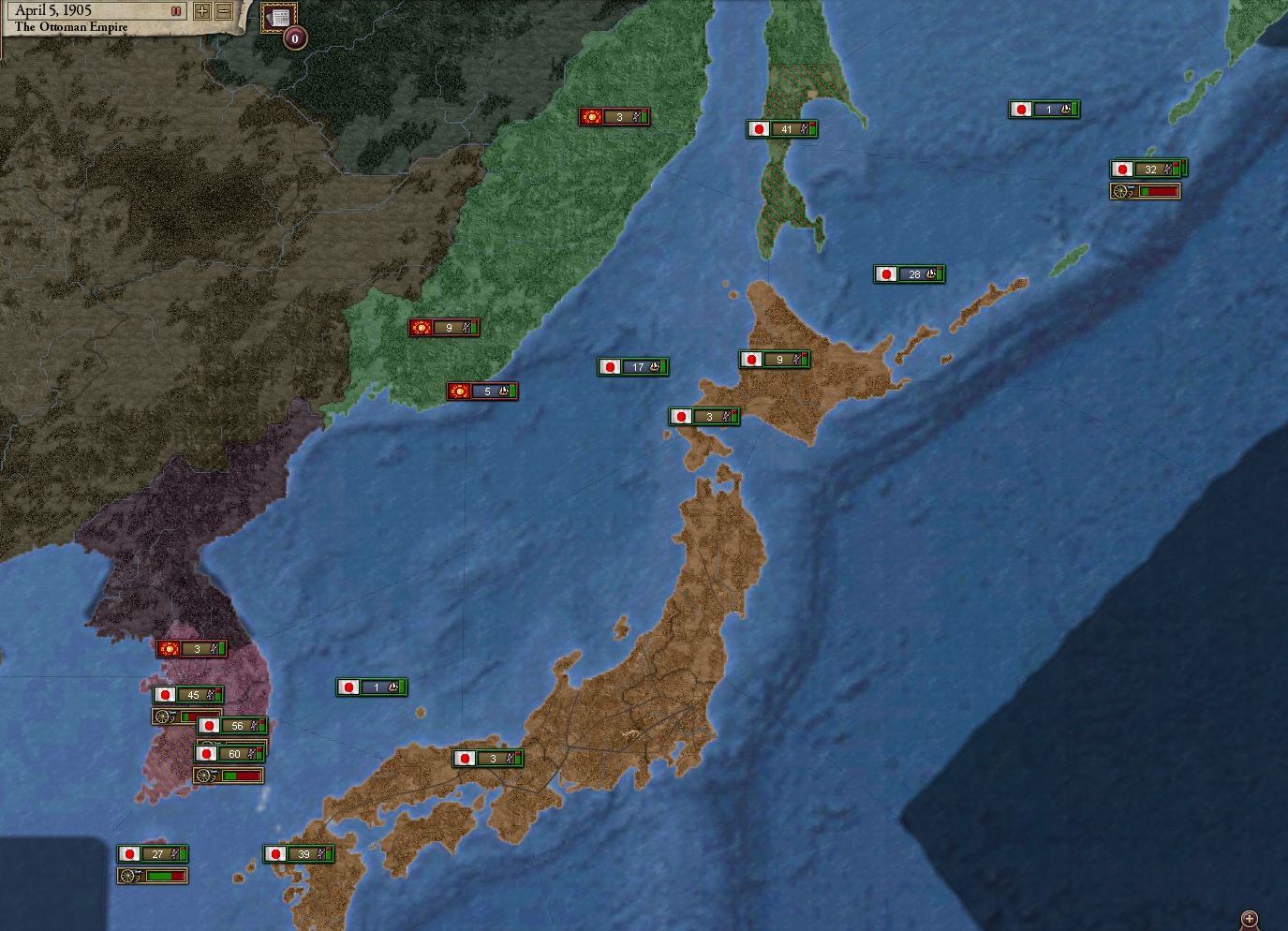
The entrance of the Empire of Japan into the Great War saw new fronts opened in Korea and the Far East (April 1905)
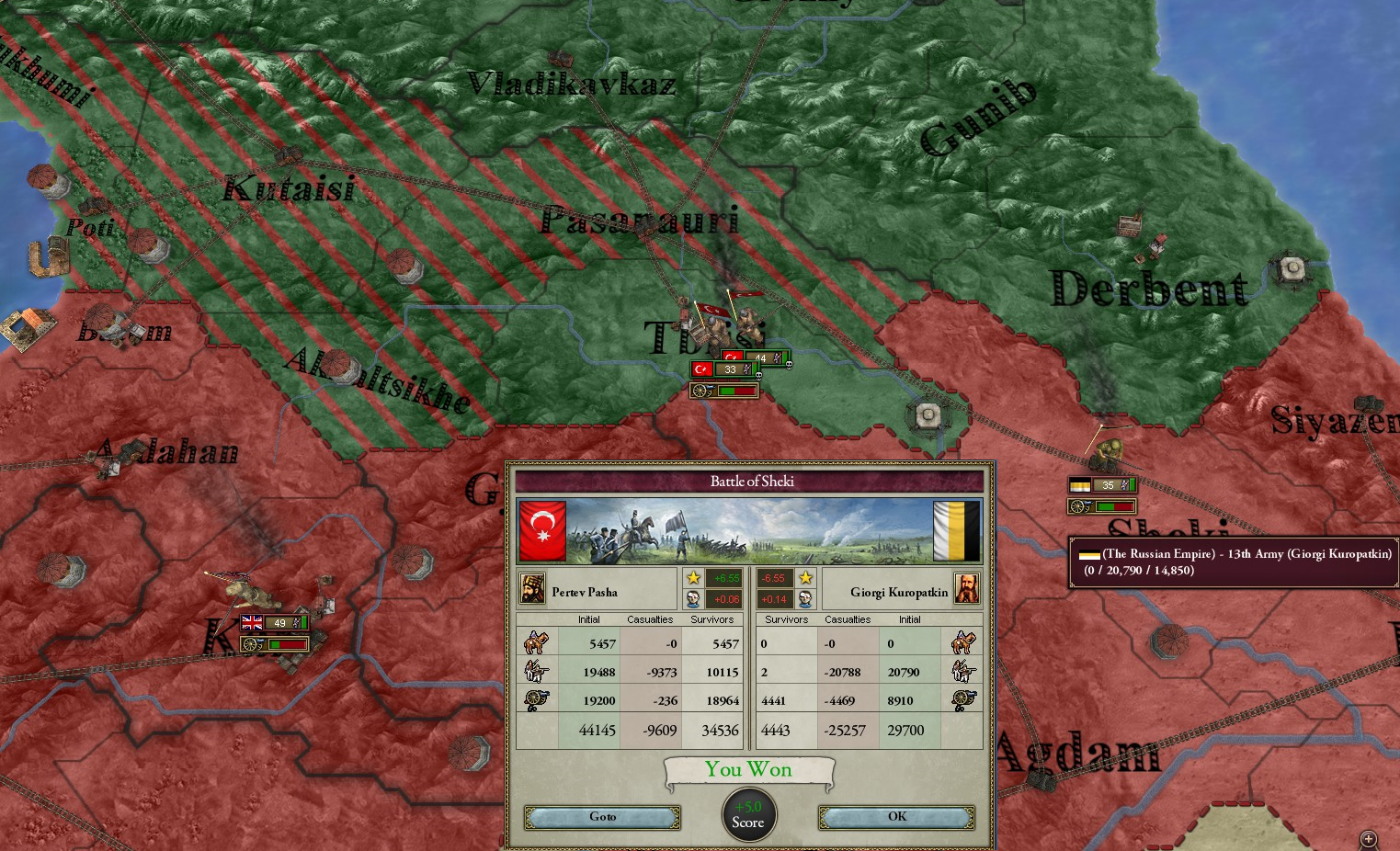
Russian forces suffer another crushing defeat at the Second Battle of Sheki (April 1905)
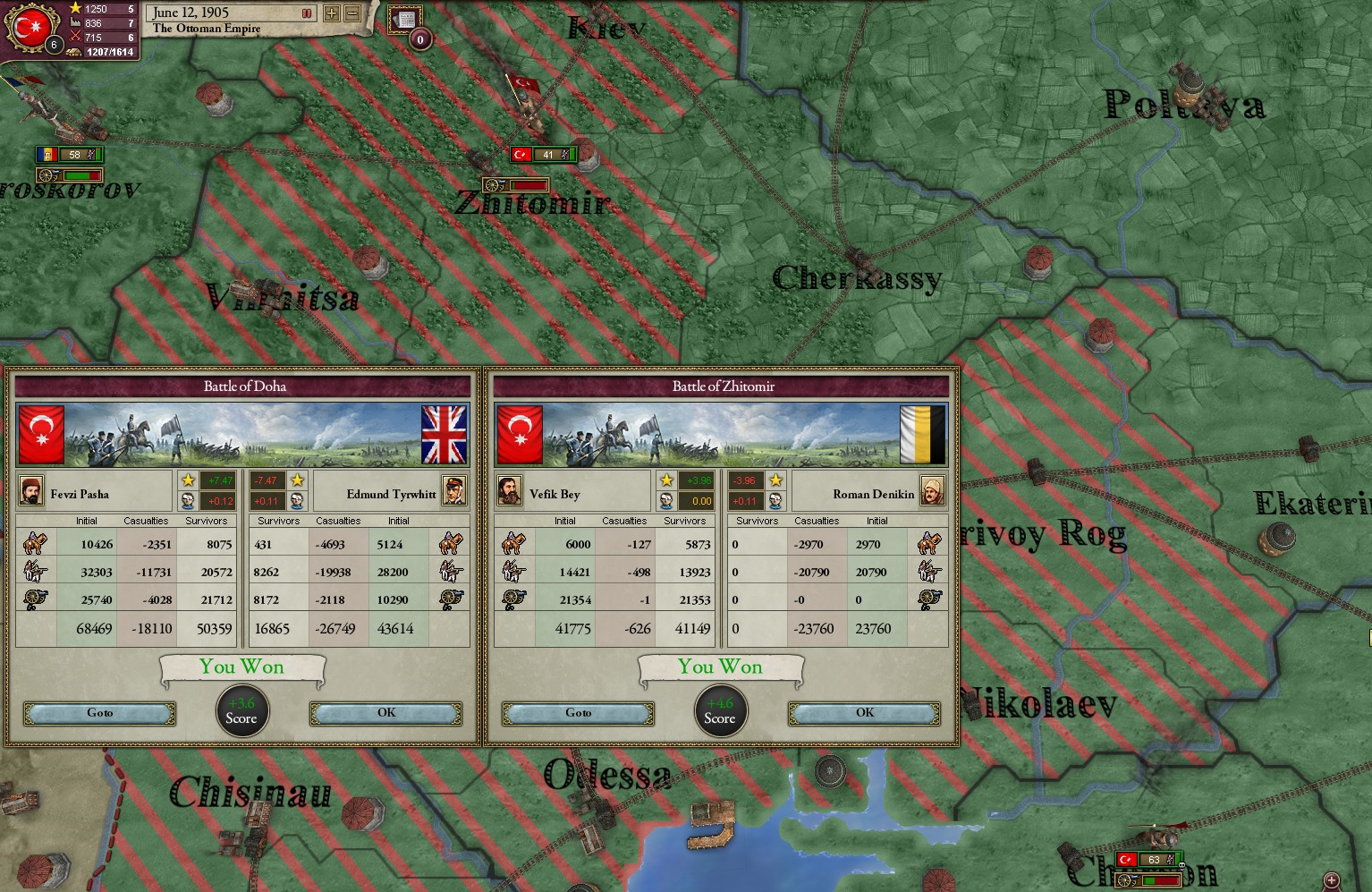
Ottoman forces score important victories at Doha and Zhitomir after the Fall of Kiev (June 1905)
British forces appearing on the Caucasian Front were less welcome, however, and they contributed to the end of the Ottoman advances into Russian Empire by Summer 1905 as our forces had to turn back to protect our supply lines. Much of Circassia had by then fallen to the Army of Egypt and ensured that the entire Black Sea coast was under the control of our troops by summer – save for the coastline of the Sea of Azov. Our Romanian allies had also entered the war in April and as such a great celebration was had when Ottoman and Romanian troops met up with German and Galician forces of our Alliance Partners around Rovne in May. The Alliance advance into Russia seemed unstoppable at this point, and the fall of Kiev to Ottoman troops in early June reinforced this fact – as did the destruction of another Russian army attempting to counter-attack at Zhitomir soon afterward. And when in Arabia, British forces under General Edmund Tyrwhitt suffered a heavy defeat at Doha, it seemed clear that the Entente Powers were heading to a heavy defeat.
The Allied Tide was halted that same month however, after news of the catastrophic defeat at Wazzan in Morocco reached the other fronts, and more British Indian reinforcements began to arrive in Russia itself after being railed through Central Asia. The defeat at Doha was avenged by the main British host in Arabia managing to engage us at Hufuf and inflicting extremely heavy losses on the combined armies of Arabia and the Trucial States, and Princely State forces under Balwantry Vaghela were narrowly defeated by the Army of Rumelia after a costly battle at Nikolaev soon afterward. As such, the second half of 1905 saw Alliance forces move to the defence against the Russian reserves, combined with the huge numbers of the British and Indian regiments; and saw our forces begin to be pushed back on all fronts - despite still managing to win a number of important victories at Kutaisi and Vladikavkaz in the Caucasus, Cherson in the Crimea, and Aden and Bayda in Arabia.
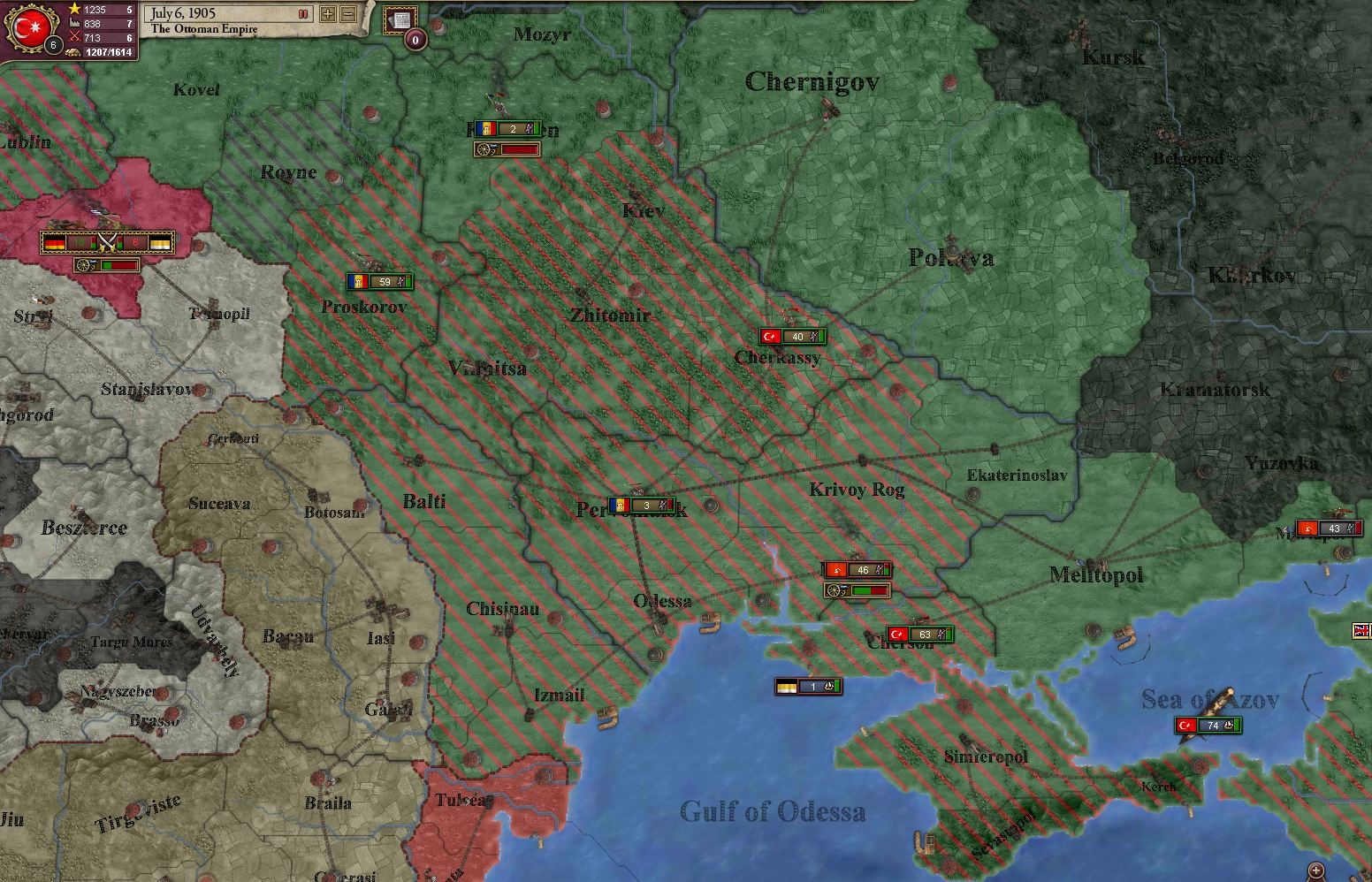
The peak of the Ottoman Advance into the Ukraine in July 1905
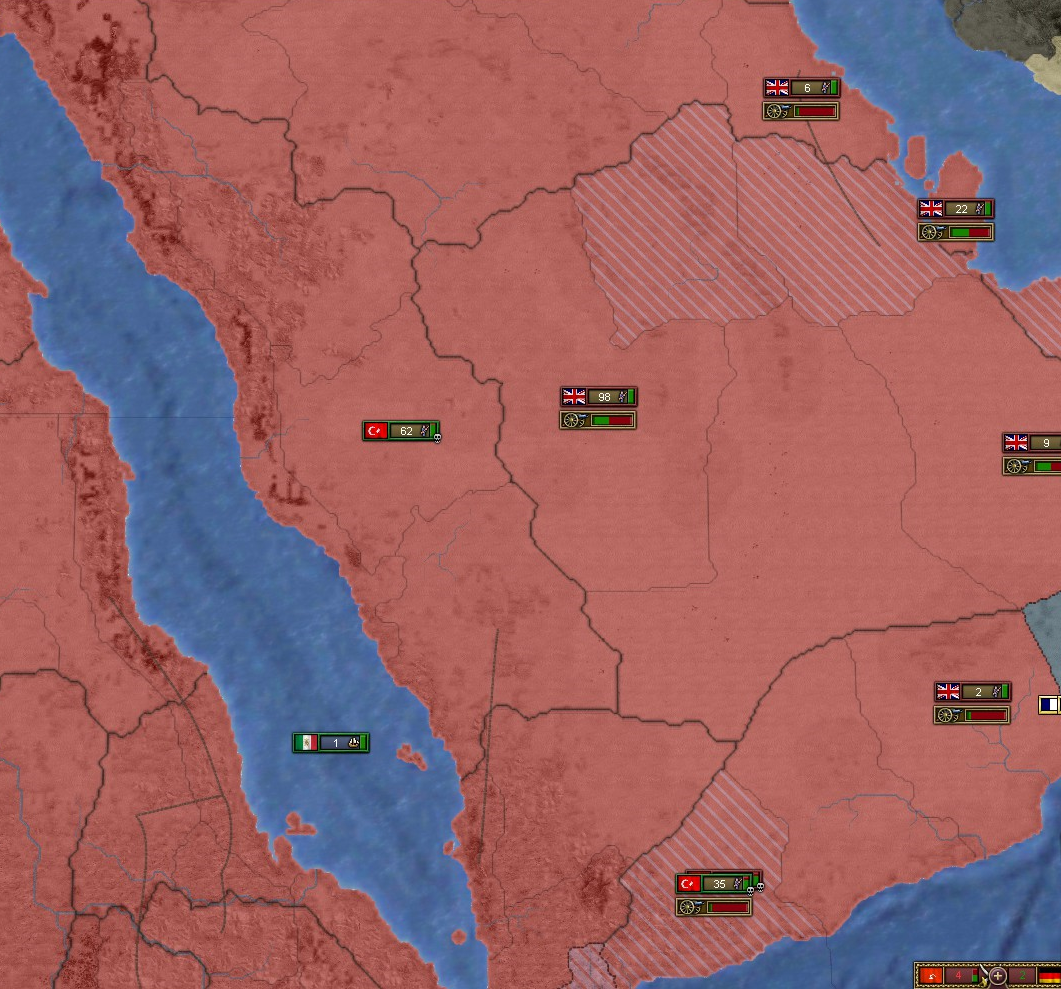
The Arabian Front in August 1905
By August the Russian counter-attacks had also driven our German allies back in Poland, leading to the Sublime Porte deciding to assign our most north-westerly army, the Army of Bosnia under Vefik Bey, to the German High Command and march it to the Eastern Front to help prop the Germans up. With the Army of Bosnia removed from the Bessarabian Front and the Army of Egypt having crossed the Straits of Kerch to join the fighting in Circassia by capturing the major city of Ekaterinodar in late August, this now left us to move to a heavily defensive strategy in the Bessarabian Front – particularly after the Alliance attempt to re-link the fronts was defeated by the Russians at Kovel. Good news did at least come from the Korean Capitulation at the end of August 1905 after Japanese forces had occupied almost the entire country, which in turn freed up more Japanese troops for their invasion of the Russian Far-East, but while Korea was the first country to be forced out of the war, they were also the least of concerns for the Sublime Porte.
Instead, September 1905 brought the news that the Porte had most feared: the Habsburg Empire had mobilised its forces. On September 9th 1905, the Habsburgs declared war on the Ottoman Empire – although they did not join the Great War itself but instead claimed that they were fighting a separate conflict to retake Croatia. The Habsburgs hoped that this would mean that they would fight us alone, but most Alliance members heeded the call to arms, with Germany, Japan, Romania, Spain, and South Africa all coming to our defence. Italy however, bound by their truce since the failed liberation of Venetia, did not, although they had already done their part in ensuring that the Habsburg force which invaded us was far smaller than it could have been a few years ago. Nonetheless, the Porte knew that we had no forces able to counter the Habsburgs and we were able to do nothing to prevent them from occupying key industrial areas in Croatia, Slavonia, and Bosnia in winter 1905.
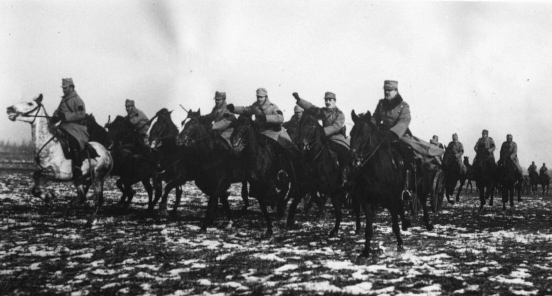
Doomed Romanian Cavalry charges offered some of the only early resistance to the Habsburg invasion of Croatia (October 1905)
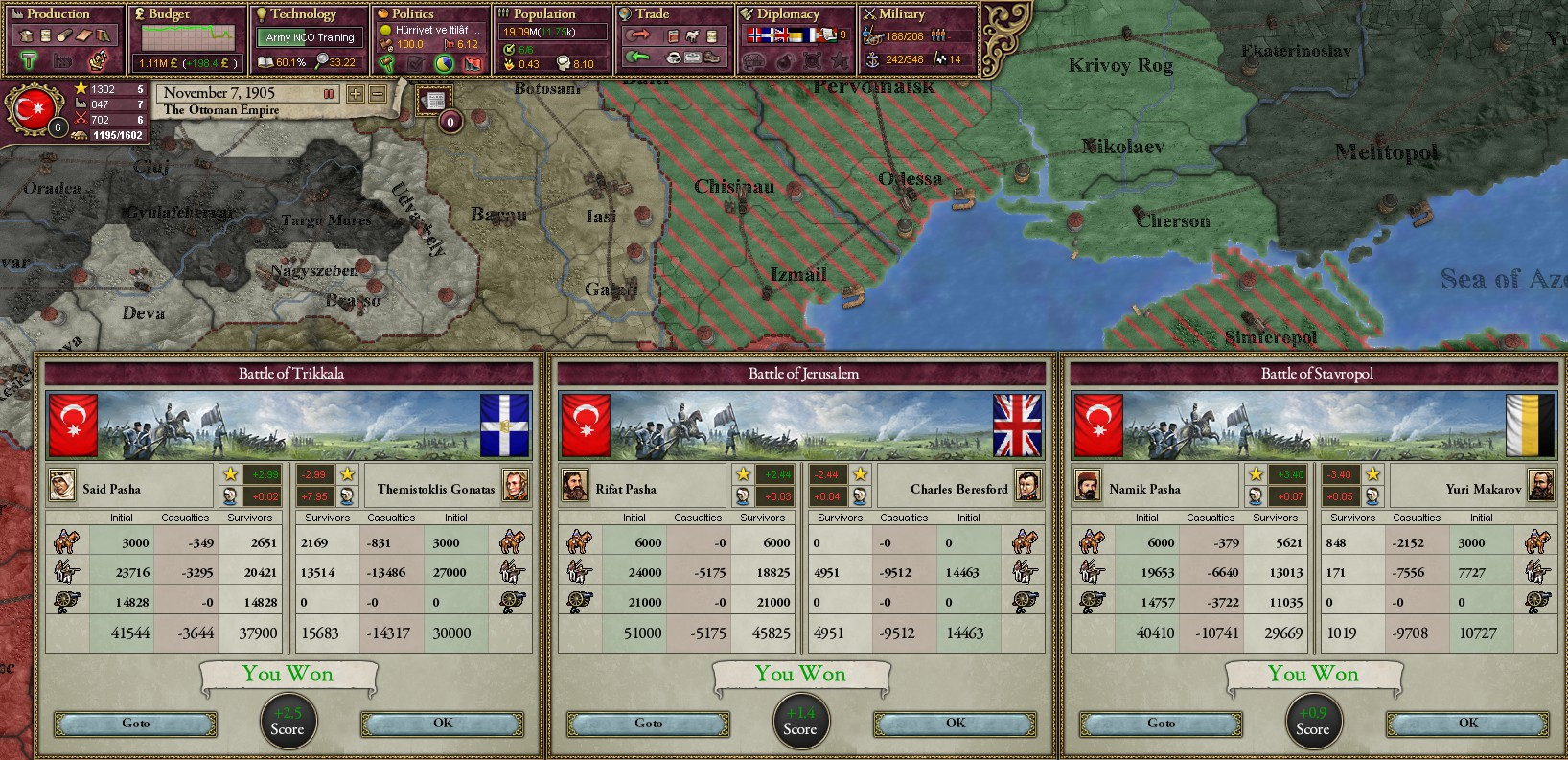
The "Triumphs of November 7th" saw Ottoman forces score crucial victories on three separate fronts
The Army of Rumelia had been recalled from Bessarabia upon the Habsburg declaration of war, but was no match for the Habsburg forces, so the Porte instead came up with a new plan. The Army of Rumelia was sent south to deal with the irritation of the Greeks, who had made little headway with their small and outdated army since their declaration of war – seizing only the cities of Larissa and Volos in Thessalia. This led to the triumphs of November 7th, when Ottoman forces on three separate fronts all reported major victories: The Greeks had been crushed at Trikkala, the British at Jerusalem, and the Russians at Stavropol. The remaining Greeks were then obliterated entirely at Arta in December, and the Porte began occupying Attica as we looked to drive them out of the war entirely, before the Habsburg advance could link up with the Greeks and offer them an opportunity to stake any claim on Ottoman territory.
As 1905 drew to a close, the war of movement had seen British armies enter much of Mesopotamia as they continued to push toward Suez, but they had not secured the Arabian Peninsula as intended, and their supply lines were very narrow as a result. The Ottoman Indian Ocean Fleet had also sprung the “Miracle of Bahrain” in December 1905, when British forces (despite battering the Ottoman army defending the island) were trapped on Bahrain by our naval forces, who now looked solely to blockade the 30,000+ British men trapped on the island. And with the Army of Egypt ending the year by scoring two significant fresh victories over Entente forces at the Battles of Chirskaya and Ekaterinodar, 1905 ended with the Porte experiencing some fresh optimism despite some heavy setbacks. The expected help of the Americans and the continued Japanese drive into Siberia gave us great hope for the long-term, despite the fact that the Russians had liberated Poland and Lithuania from German occupation meaning that for the moment at least, the Entente homelands remained unoccupied.
- 2
All in all 1905 looks like a very see-saw sort of year. There are some impressive victories, but also great threats. The entry of the Habsburgs is most unwelcome, one can only hope that they will find themselves greatly inconvenienced soon.
this should be coming with the readding of arabic cultures as accepted, that's a net loss at the moment I guessThe British attack on Mecca, combined with the Sultan's call for Jihad, saw Arab Leaders end the Arab Revolt in April 1905
excellent news all aroundMeanwhile in Europe, Ottoman forces on the Bessarabian Front continued to advance into Russian territory, with the city of Odessa falling in January 1905, and a Russian army annihilated at Proskorov in March. By April, Ottoman forces had reached the River Dnieper and were threatening the city of Kiev itself, while a Russian counter-attack had been defeated at Odessa and the Army of Egypt had secured control of most of the Crimean Peninsula. In the Caucasus too, the entirety of Georgia had now been occupied by Ottoman forces with only Tbilisi holding out by the end of March, although a new Russian army had invaded Ottoman Azerbaijan, where the Russian suffered another catastrophic defeat at the Second Battle of Sheki in April. Pertev Pasha’s Army of Syria then pursued the Russians and forced the surrender of that entire Russian invasion force at Derbent.
well afterwards the news weren't as excellent, but still positive despite setbacks. why are the germans struggling against the seemingly not so strong russia? the french distracting them too much?
anxiously waiting for the americans to come to our aid.
also, what is the wargoal status? did germany add anything from our side?
The Habsburgs are a problem that the Porte hopes can be delayed, but the Great War's demand of resources leaves us in a very difficult position with regard to fighting on that front.All in all 1905 looks like a very see-saw sort of year. There are some impressive victories, but also great threats. The entry of the Habsburgs is most unwelcome, one can only hope that they will find themselves greatly inconvenienced soon.
I believe (hopefully) that the Mashriqi can indeed be regained as an accepted culture, but will have to wait and see there. The Germans, unfortunately, haven't performed all that well thus far, partly because they had a very strangely over-militarised colony in East Africa and too few armies in Europe as a result.this should be coming with the readding of arabic cultures as accepted, that's a net loss at the moment I guess
excellent news all around
well afterwards the news weren't as excellent, but still positive despite setbacks. why are the germans struggling against the seemingly not so strong russia? the french distracting them too much?
anxiously waiting for the americans to come to our aid.
also, what is the wargoal status? did germany add anything from our side?
American support would be most welcome, yes.
The Austrian declaration of war is a nasty surprise, but fighting them in a separate war may yet prove to be a mixed blessing. Much as it may be unpalatable to the Porte and unpopular with the people, cutting Croatia loose (at least for the time being) could help take the pressure off and allow the Ottomans to focus all their energies on the larger conflict. Hopefully, of course, it won't come to that...
even if they take control of the seas and prevent troop transports and do nothing else, that would be a great boon for us. can we see from the ledger how big of an army and navy america has?American support would be most welcome, yes.
well austria joining the war highlighted the strategic problem of the ottomans (the germans have a similar problem). without at least 2 neighbors as allies, all fronts are vulnerable. as long as the english have a strong navy, they can use all the army they raise on the uk islands or india elsewhere without any repercussions (is there a country around there that can be called into war to cause havoc in india or does our enemies have the entire asia except china among themselves?). russia has no worry about its northern borders (and until lately eastern, japan joining has been a blessing) etc...
let's see what's to come
Last edited:
Wow, I am very impressed (and jealous!) with how grand an overview you are giving us of this global conflict!
It seems like the entry of Italy, Japan and the United States on your side mean victory assured but it will be a hard fight reaching there.
It seems like the entry of Italy, Japan and the United States on your side mean victory assured but it will be a hard fight reaching there.
It's certainly an option to cut Croatia... Though for now, the Habsburgs are generally just being ignored in the hope that the Great War may end first and allow us to make a late counter-attack. The Porte is very much delaying dealing with that front.The Austrian declaration of war is a nasty surprise, but fighting them in a separate war may yet prove to be a mixed blessing. Much as it may be unpalatable to the Porte and unpopular with the people, cutting Croatia loose (at least for the time being) could help take the pressure off and allow the Ottomans to focus all their energies on the larger conflict. Hopefully, of course, it won't come to that...
In terms of the Navies of the Great Powers before the war began, they were roughly at this level:even if they take control of the seas and prevent troop transports and do nothing else, that would be a great boon for us. can we see from the ledger how big of an army and navy america has?
well austria joining the war highlighted the strategic problem of the ottomans (the germans have a similar problem). without at least 2 neighbors as allies, all fronts are vulnerable. as long as the english have a strong navy, they can use all the army they raise on the uk islands or india elsewhere without any repercussions (is there a country around there that can be called into war to cause havoc in india or does our enemies have the entire asia except china among themselves?). russia has no worry about its northern borders (and until lately eastern, japan joining has been a blessing) etc...
let's see what's to come
Royal Navy: ~190 ships
La Royale: ~110 ships
Armada Española: ~100 ships
Osmanli Donanmasi: ~80 ships
Koninklijke Marine: ~70 ships
United States Navy: ~70 ships
Kriegsmarine: ~50 ships
Regia Marina: ~50 ships
Imperial Japanese Navy: ~50 ships
Russian Imperial Navy: ~40 ships
KuK Kriegsmarine: ~30 ships
The US have a very large army, behind only Britain & Russia I believe. Japan was the only plausible ally (of note) we can have in Asia though, as Persia is still in the Russian Sphere, and Siam in the British. And the Qing remain uncivilized.
The lack of neighbouring allies is certainly a major problem though, that's true. The Entente are able to surround almost all of the Alliance members.
Glad you're enjoying!Wow, I am very impressed (and jealous!) with how grand an overview you are giving us of this global conflict!
It seems like the entry of Italy, Japan and the United States on your side mean victory assured but it will be a hard fight reaching there.
Italy is a long way from being rearmed yet, though the relief they've provided for Spain can't be overstated. Japan have very invaluable so far though - knocking out Korea was a nice morale boost, but the way the Japanese are pouring into Siberia is hopefully going to cause the Russians a lot of problems next year. We shall have to wait and see what the American behemoth brings...
Last edited:
Royal Navy: ~190 ships
United States Navy: ~70 ships
didn't expect this
Royal Dutch Navy: ~70 ships.
The Koninklijke Marine, in case you want to translate that one as well.
Now that war is really escalating... and no decisive blow on any side.
I'll keep on watching.
I'll keep on watching.
Excellent read, and to think it can go to the post-ww2 period, very exciting stuff.
Chapter Forty-Two: The Western Theatres of the Great War (1906)
Due to the immense scope of the Great War, it is almost impossible to report on all its many great battles concurrently and do the great tragedy justice. As such, these chapters will be divided into the “Western” and “Eastern” Theatres, with each containing a significant number of fronts, and the chapter focusing solely on events taking place in those theatres. The Western Theatres of the war as such contain the African Fronts, the Moroccan Front, the Iberian Front, the Italian Front, and the Western Front. These theatres were chiefly an assortment of Alliance Members fighting against the Kingdom of France, with occasional support from the United Kingdom, and other Entente powers.
The Ottoman Empire saw comparatively little fighting in the Western Theatres in 1906 as the Sublime Porte continued to reel from the disaster of Wazzan in July 1905. A new full strength army was being raised across the Empire and gathered in Tunis for a return to the Moroccan Front, but this would not be ready until summer 1906 at the earliest. In the meantime, only the recovering Army of the Sahel covered the entirety of Ottoman Africa, and that was still rebuilding its strength on Lake Mao. While this meant that the Porte was unable to influence events on the Western Front for the Alliance; it also meant that when the French launched their Spring Offensive of 1906, the Porte was not the one standing in its way.
Instead, after a fairly quiet winter, the French general staff began the offensive on March 16th 1906 on the plains of Iberia. The Spanish 3rd Army which had so stubbornly – and narrowly – halted the French advance in August 1905 once again found itself fighting against numerically superior opposition, and with half the country occupied Spain had been unable to regain much strength during the winter. The initial French assault was aimed at the key rail-hub of Avil; through which the vast majority of Spanish supplies to the provinces of Leon and Galicia now flowed. After much brutal fighting through March as the Spanish reinforced the city in a desperate bid to keep the supply corridor open, the superior French numbers and particularly their far more numerous supplies of artillery shells bore fruit. The Spanish were slowly but surely driven back to the city itself, despite continuing to inflict huge casualties on the French, and on April 28th the French cut the railroad just north of Avila.
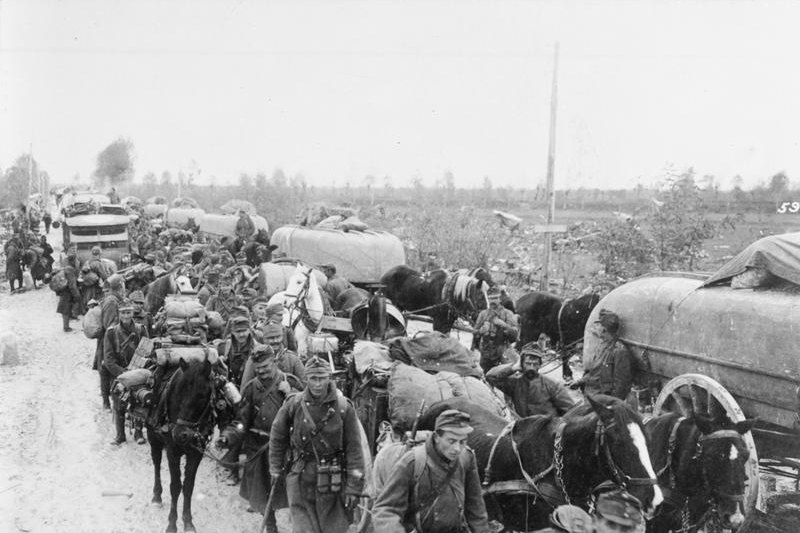
The Spanish Army began to fall apart following the Battle of Avila (March-June 1906)
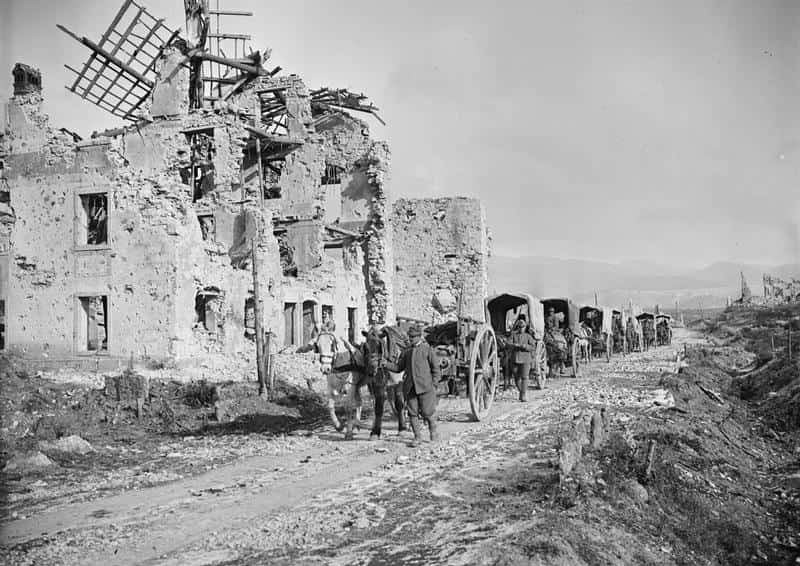
Infrastructure around Madrid was devastated during the French Spring Offensive of 1906
This devastating blow now left the Spanish defenders in the north extremely isolated, and the French launched their secondary attack. A swift drive along the coast obliterated the weak Spanish defences and saw the rapid capitulation of Santander and Oviedo, before another Spanish implosion saw the entirety of Leon and Galicia fall in June 1906. Meanwhile at Avila, the exhausted Spaniards now found themselves fighting fresh French forces as troops were siphoned away from the north following the Spanish capitulation, and the 3rd Army was forced to retreat back to Madrid itself. With the British also now breaking out of their beachheads at Cadiz and Gibraltar, the final Spanish collapse now began. As British troops marched into Seville almost unopposed, the French artillery made a swift and merciless pounding of the Spanish capital. It surrendered after just 6 days. The Spanish government had fled via to the town of Huelva and from there escaped across the sea to Melilla before eventually reaching Istanbul by train, but the Spain was almost entirely occupied.
It was amidst this collapse that the newly raised Ottoman 3rd Army – named in solidarity of our battered Spanish allies, made a desperate attempt to take Gibraltar and provide an escape route through Southern Spain for the remaining dispersed Spanish forces. 42,000 brave Ottoman men attacked the British fortress, but the Entente were soon able to bring reinforcements to the defenders. Throughout September vicious fighting roared as Ottoman and Spanish troops defended our beachhead against a combined Anglo-Franco army. But despite inflicting more extremely heavy casualties on our foes, we could not force their surrender. On October 2nd 1906 the Porte called the attack off. We had lost around 15,000 men and inflicted over twice that on the Entente… But critically, we had failed to prevent the fall of Spain.
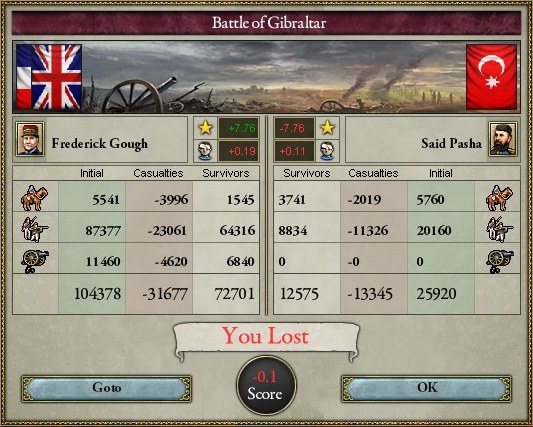
The Alliance defeat at the Battle of Gibraltar signalled the end of fighting on the Iberian Front (August-October 1906)
It should not, however, be said that the Spanish Army found no success in 1906. The French decision to pull troops from Africa had left the remaining British and French troops in West Africa in an extremely difficult position, and the Spanish and German forces in Africa had seized the entirety of British Central & Southern Africa, along with the Dominion of Botswana, by the end of April. West Africa meanwhile saw much fighting, with the Spanish scoring numerous successes over their French and British opponents. The Ottoman Army of the Sahel was therefore sent to support the continued Spanish drive through West Africa, and in August & September of 1906 scored two major victories over the British at Jugu and Atakpame in British Nigeria. While the African theatre was of little strategic importance to the overall war effort, the Porte was nonetheless determined to ensure that the Spanish armies in Africa remained valid and intact fighting forces, in order to persuade the Spanish government-in-exile not to make a separate peace with the Entente – something which was successful even after the final fall of Spain.
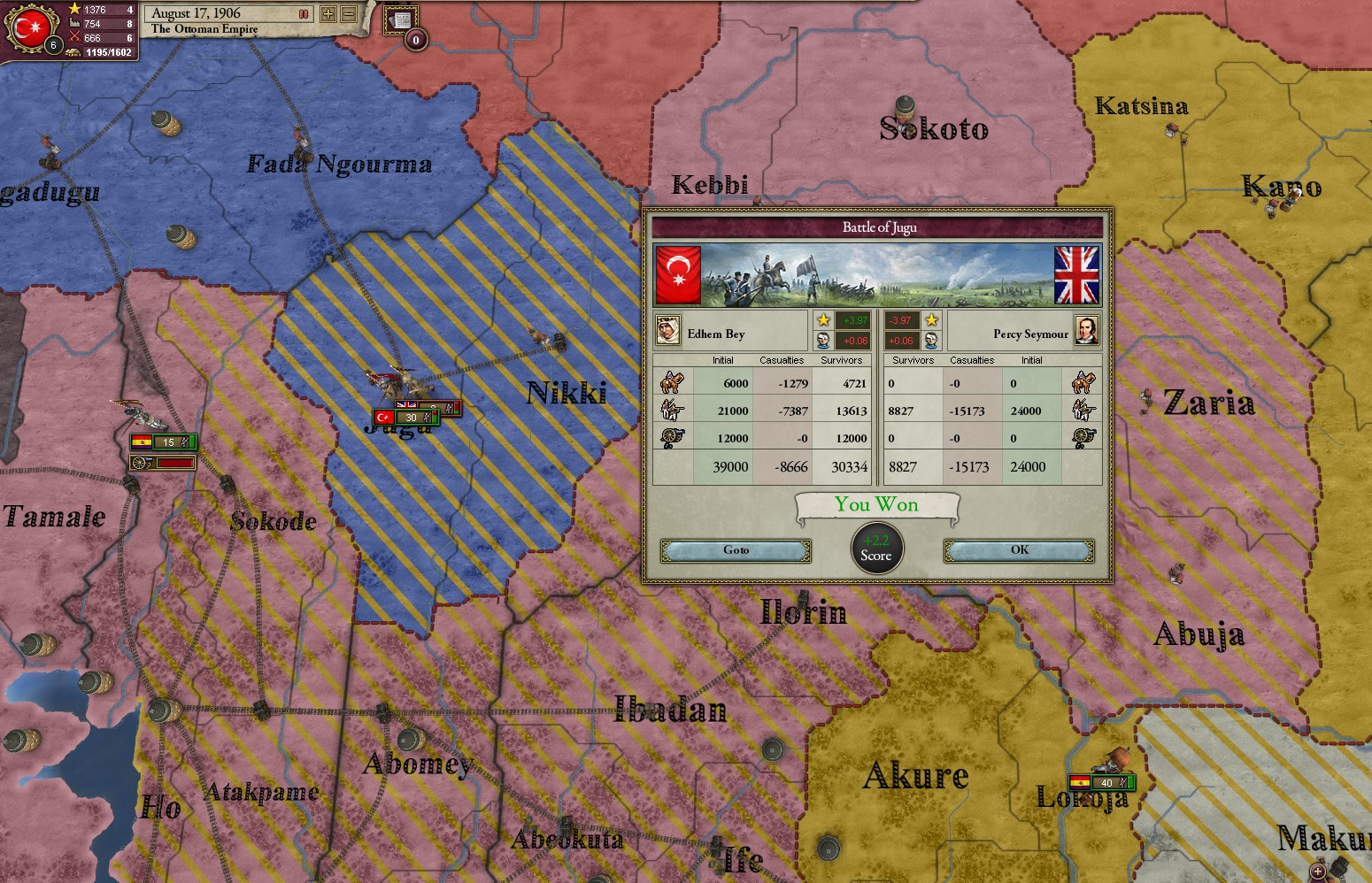
The West African Front and the Battle of Jugu (August 1906)
However, despite the success in Africa, the collapse of the Spanish Army in Iberia had freed up significant French forces for an Autumn Offensive on the Western Front or the Italian Front – and in the end the French decided to attack on both. The Italians had been slowly pushed back out of Provence & Savoie through 1906 despite the small number of French forces that had been available in the region, and this had already culminated in the French liberation of Nice on July 27th 1906, much to the embarrassment of the Italian government. The Autumn Offensive – pitting some of the best French veterans against the Italians, then became a whitewash. Within a week of its launching in late September 1906, the Italian army had collapsed across the entire front and suffered a catastrophic defeat on the outskirts of Turin. The demoralised Italians began surrendering in droves – to the point that when the beleaguered Italian Commander in Chief Luigi Cadorno ordered a counter-attack at Genoa on October 17th, his own staff at his HQ shot him and surrendered instead.
The almost farcical collapse of the Italian Front triggered huge recriminations in the Italian capital, as politicians and military officers scrambled to find scapegoats for the obliteration of the Italian army. But most importantly, with the Italian people offering little to no support for the war effort, the Italian government signed an armistice on December 8th 1906. While Cadorno and his deputy were eventually blamed for the Italian unravelling, the quick surrender of the Italian government did successfully spare the Italian industrial regions of the North from occupation. And though the terms of the Treaty of Turin that ended the war for Italy involved harsh reparations to the French government, and prohibitions on increasing the size of the Italian army for five years; they did avoid ceding any Italian territory to the Entente.
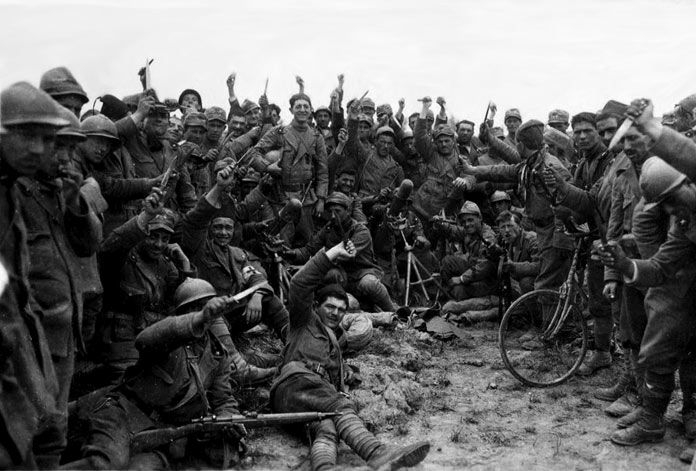
French forces celebrate the Italian Surrender in December 1906
Historians would later reflect on the collapse of the Spanish and Italian armies as being the first of a series of dominos, the effects of which would be felt all across the world, but the most immediate effects were felt on the Western Front – which was now the only front where the French were fighting in significant numbers. The Western Front had been comparatively quiet in 1906, with the Germans still heavily involved in the East, and the French having stabilised the front along the rivers Somme, Oise, and Marne. The French Autumn Offensive had been concentrated largely on the Belgian Sector around Saint-Quentin – where the largest creeping artillery barrage yet seen had turned the battlefield into a quagmire and triggered the start of three months of constant fighting at an immense cost to both sides… But by the end of 1906, the French had driven the Belgians back to the pre-war border – save for some of the coastal regions around Calais, and were poised to invade Belgium itself. It was clear that the Western Theatres had turned decisively in favour of the Entente through 1906; and that the only salvation for the Alliance would require a dramatic change of fortune - Or the arrival of the long-awaited American Expeditionary Force. But from that hope there was, perhaps, the most devastating defeat of all.
The Battle of the Atlantic had begun as soon as the United States of America had joined the war, with the British Royal Navy attempting to intercept all American shipping while also maintaining the blockade of Germany and the Straits of Gibraltar. The US Navy, whilst significantly smaller than that of the British, was large enough to threaten that blockade, and indeed perhaps join with the German navy to destroy the British merchant shipping fleet and inflict a blockade on Britain instead. To counter this threat, the British planned to prevent the American Fleet from reaching Europe at all costs, and so through Spring and Summer of 1906 the Atlantic blockade on Germany was in fact loosened as the British instead concentrated on hunting down and destroying the American Navy. For Germany, whilst the relief from the blockade was welcome, the increasingly dire situation in Spain and Italy meant that American troops were more desperately needed than ever, and the US Army was rapidly expanding to become the single largest military force in the entire world. But getting that force to Europe required an incredibly dangerous crossing of the Atlantic.
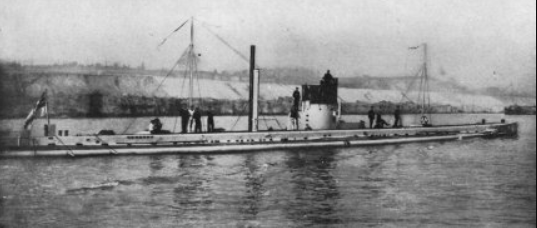
A German U-Boat operating in the Atlantic during the Great War
It wasn't until September 1906 that the Americans finally responded to the increasingly desperate pleas of the Allies and authorised a crossing. Virtually the entire American fleet was gathered, with the Americans ready to support the combined Spanish-Ottoman forces in Southern Spain and reopen the Spanish Front. The US 7th Army, with over 60,000 men, would be the first across the Atlantic, but more would follow. The American fleet set off from Norfolk, Virginia and swung South, hoping to avoid the Royal Navy at all costs by travelling through more tropical waters. The gambit failed. British submarines operating in the Caribbean spotted the US Task Force early and relayed it back to the Royal Navy Grand Fleet, and the British moved to intercept the Americans south of the Azores. On September 28th 1906, at 10:27am, the British attacked. Throughout the day brutal action between Battleships and Cruisers on both sides saw numerous ships sunk, but a British submarine was able to score a direct hit on the transport ship USS Mercury just after midday, and the shock caused US Admiral William S. Sims to order a retreat lest other troop transports be hit.
It was too late. By the end of the day, 7 more transports had been sunk, along with 5 American battleships, 16 cruisers, and 25 destroyers and other light ships. While the British had also lost 7 battleships, 20 cruisers, and over 40 destroyers and submarines, the Royal Navy's greater size won out, and the remnants of the US Navy were utterly crippled by the greatest naval battle in history - known as the Battle of the Azores. Over 40,000 American soldiers and sailors were dead, the American war plan was in tatters... And as news of the catastrophe reached America, the American public turned heavily against sending any more troops overseas. Never again for the rest of the war would the Americans attempt to cross the Atlantic. The old adage had proven true: Britannia ruled the waves.
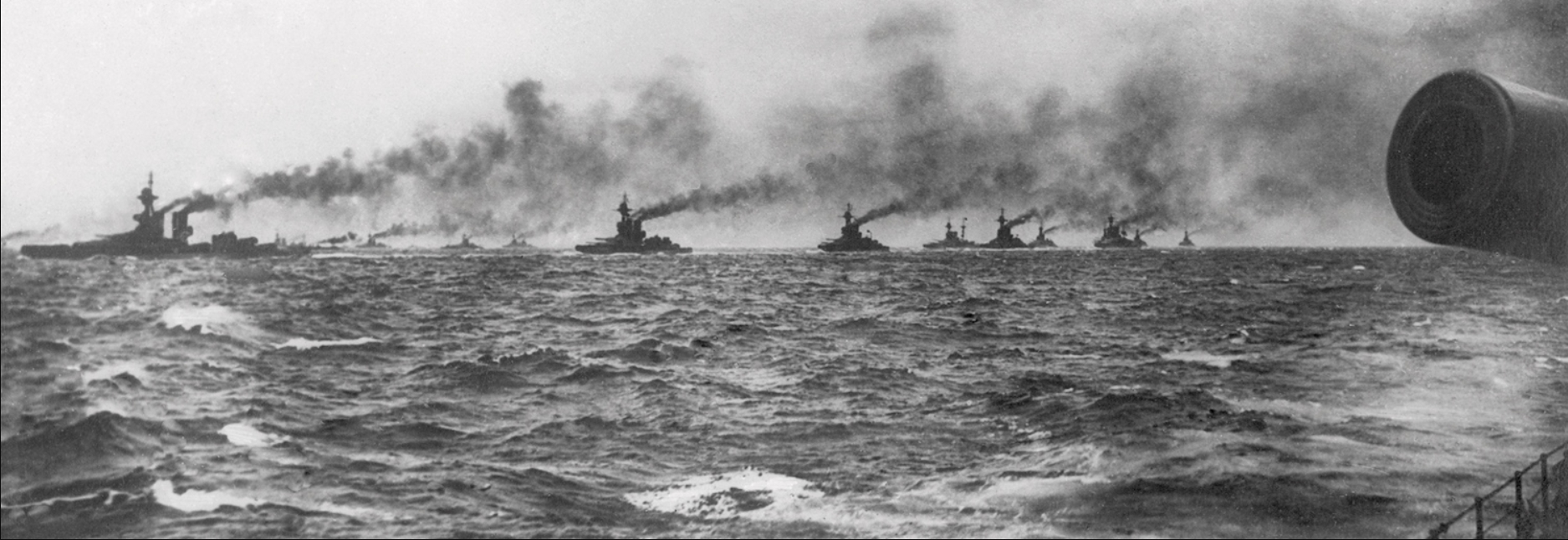
British ships in action at the Battle of the Azores (September 28th 1906)
The Ottoman Empire saw comparatively little fighting in the Western Theatres in 1906 as the Sublime Porte continued to reel from the disaster of Wazzan in July 1905. A new full strength army was being raised across the Empire and gathered in Tunis for a return to the Moroccan Front, but this would not be ready until summer 1906 at the earliest. In the meantime, only the recovering Army of the Sahel covered the entirety of Ottoman Africa, and that was still rebuilding its strength on Lake Mao. While this meant that the Porte was unable to influence events on the Western Front for the Alliance; it also meant that when the French launched their Spring Offensive of 1906, the Porte was not the one standing in its way.
Instead, after a fairly quiet winter, the French general staff began the offensive on March 16th 1906 on the plains of Iberia. The Spanish 3rd Army which had so stubbornly – and narrowly – halted the French advance in August 1905 once again found itself fighting against numerically superior opposition, and with half the country occupied Spain had been unable to regain much strength during the winter. The initial French assault was aimed at the key rail-hub of Avil; through which the vast majority of Spanish supplies to the provinces of Leon and Galicia now flowed. After much brutal fighting through March as the Spanish reinforced the city in a desperate bid to keep the supply corridor open, the superior French numbers and particularly their far more numerous supplies of artillery shells bore fruit. The Spanish were slowly but surely driven back to the city itself, despite continuing to inflict huge casualties on the French, and on April 28th the French cut the railroad just north of Avila.

The Spanish Army began to fall apart following the Battle of Avila (March-June 1906)

Infrastructure around Madrid was devastated during the French Spring Offensive of 1906
This devastating blow now left the Spanish defenders in the north extremely isolated, and the French launched their secondary attack. A swift drive along the coast obliterated the weak Spanish defences and saw the rapid capitulation of Santander and Oviedo, before another Spanish implosion saw the entirety of Leon and Galicia fall in June 1906. Meanwhile at Avila, the exhausted Spaniards now found themselves fighting fresh French forces as troops were siphoned away from the north following the Spanish capitulation, and the 3rd Army was forced to retreat back to Madrid itself. With the British also now breaking out of their beachheads at Cadiz and Gibraltar, the final Spanish collapse now began. As British troops marched into Seville almost unopposed, the French artillery made a swift and merciless pounding of the Spanish capital. It surrendered after just 6 days. The Spanish government had fled via to the town of Huelva and from there escaped across the sea to Melilla before eventually reaching Istanbul by train, but the Spain was almost entirely occupied.
It was amidst this collapse that the newly raised Ottoman 3rd Army – named in solidarity of our battered Spanish allies, made a desperate attempt to take Gibraltar and provide an escape route through Southern Spain for the remaining dispersed Spanish forces. 42,000 brave Ottoman men attacked the British fortress, but the Entente were soon able to bring reinforcements to the defenders. Throughout September vicious fighting roared as Ottoman and Spanish troops defended our beachhead against a combined Anglo-Franco army. But despite inflicting more extremely heavy casualties on our foes, we could not force their surrender. On October 2nd 1906 the Porte called the attack off. We had lost around 15,000 men and inflicted over twice that on the Entente… But critically, we had failed to prevent the fall of Spain.

The Alliance defeat at the Battle of Gibraltar signalled the end of fighting on the Iberian Front (August-October 1906)
It should not, however, be said that the Spanish Army found no success in 1906. The French decision to pull troops from Africa had left the remaining British and French troops in West Africa in an extremely difficult position, and the Spanish and German forces in Africa had seized the entirety of British Central & Southern Africa, along with the Dominion of Botswana, by the end of April. West Africa meanwhile saw much fighting, with the Spanish scoring numerous successes over their French and British opponents. The Ottoman Army of the Sahel was therefore sent to support the continued Spanish drive through West Africa, and in August & September of 1906 scored two major victories over the British at Jugu and Atakpame in British Nigeria. While the African theatre was of little strategic importance to the overall war effort, the Porte was nonetheless determined to ensure that the Spanish armies in Africa remained valid and intact fighting forces, in order to persuade the Spanish government-in-exile not to make a separate peace with the Entente – something which was successful even after the final fall of Spain.

The West African Front and the Battle of Jugu (August 1906)
Exit Italy
However, despite the success in Africa, the collapse of the Spanish Army in Iberia had freed up significant French forces for an Autumn Offensive on the Western Front or the Italian Front – and in the end the French decided to attack on both. The Italians had been slowly pushed back out of Provence & Savoie through 1906 despite the small number of French forces that had been available in the region, and this had already culminated in the French liberation of Nice on July 27th 1906, much to the embarrassment of the Italian government. The Autumn Offensive – pitting some of the best French veterans against the Italians, then became a whitewash. Within a week of its launching in late September 1906, the Italian army had collapsed across the entire front and suffered a catastrophic defeat on the outskirts of Turin. The demoralised Italians began surrendering in droves – to the point that when the beleaguered Italian Commander in Chief Luigi Cadorno ordered a counter-attack at Genoa on October 17th, his own staff at his HQ shot him and surrendered instead.
The almost farcical collapse of the Italian Front triggered huge recriminations in the Italian capital, as politicians and military officers scrambled to find scapegoats for the obliteration of the Italian army. But most importantly, with the Italian people offering little to no support for the war effort, the Italian government signed an armistice on December 8th 1906. While Cadorno and his deputy were eventually blamed for the Italian unravelling, the quick surrender of the Italian government did successfully spare the Italian industrial regions of the North from occupation. And though the terms of the Treaty of Turin that ended the war for Italy involved harsh reparations to the French government, and prohibitions on increasing the size of the Italian army for five years; they did avoid ceding any Italian territory to the Entente.

French forces celebrate the Italian Surrender in December 1906
Historians would later reflect on the collapse of the Spanish and Italian armies as being the first of a series of dominos, the effects of which would be felt all across the world, but the most immediate effects were felt on the Western Front – which was now the only front where the French were fighting in significant numbers. The Western Front had been comparatively quiet in 1906, with the Germans still heavily involved in the East, and the French having stabilised the front along the rivers Somme, Oise, and Marne. The French Autumn Offensive had been concentrated largely on the Belgian Sector around Saint-Quentin – where the largest creeping artillery barrage yet seen had turned the battlefield into a quagmire and triggered the start of three months of constant fighting at an immense cost to both sides… But by the end of 1906, the French had driven the Belgians back to the pre-war border – save for some of the coastal regions around Calais, and were poised to invade Belgium itself. It was clear that the Western Theatres had turned decisively in favour of the Entente through 1906; and that the only salvation for the Alliance would require a dramatic change of fortune - Or the arrival of the long-awaited American Expeditionary Force. But from that hope there was, perhaps, the most devastating defeat of all.
The Battle of the Atlantic had begun as soon as the United States of America had joined the war, with the British Royal Navy attempting to intercept all American shipping while also maintaining the blockade of Germany and the Straits of Gibraltar. The US Navy, whilst significantly smaller than that of the British, was large enough to threaten that blockade, and indeed perhaps join with the German navy to destroy the British merchant shipping fleet and inflict a blockade on Britain instead. To counter this threat, the British planned to prevent the American Fleet from reaching Europe at all costs, and so through Spring and Summer of 1906 the Atlantic blockade on Germany was in fact loosened as the British instead concentrated on hunting down and destroying the American Navy. For Germany, whilst the relief from the blockade was welcome, the increasingly dire situation in Spain and Italy meant that American troops were more desperately needed than ever, and the US Army was rapidly expanding to become the single largest military force in the entire world. But getting that force to Europe required an incredibly dangerous crossing of the Atlantic.

A German U-Boat operating in the Atlantic during the Great War
It wasn't until September 1906 that the Americans finally responded to the increasingly desperate pleas of the Allies and authorised a crossing. Virtually the entire American fleet was gathered, with the Americans ready to support the combined Spanish-Ottoman forces in Southern Spain and reopen the Spanish Front. The US 7th Army, with over 60,000 men, would be the first across the Atlantic, but more would follow. The American fleet set off from Norfolk, Virginia and swung South, hoping to avoid the Royal Navy at all costs by travelling through more tropical waters. The gambit failed. British submarines operating in the Caribbean spotted the US Task Force early and relayed it back to the Royal Navy Grand Fleet, and the British moved to intercept the Americans south of the Azores. On September 28th 1906, at 10:27am, the British attacked. Throughout the day brutal action between Battleships and Cruisers on both sides saw numerous ships sunk, but a British submarine was able to score a direct hit on the transport ship USS Mercury just after midday, and the shock caused US Admiral William S. Sims to order a retreat lest other troop transports be hit.
It was too late. By the end of the day, 7 more transports had been sunk, along with 5 American battleships, 16 cruisers, and 25 destroyers and other light ships. While the British had also lost 7 battleships, 20 cruisers, and over 40 destroyers and submarines, the Royal Navy's greater size won out, and the remnants of the US Navy were utterly crippled by the greatest naval battle in history - known as the Battle of the Azores. Over 40,000 American soldiers and sailors were dead, the American war plan was in tatters... And as news of the catastrophe reached America, the American public turned heavily against sending any more troops overseas. Never again for the rest of the war would the Americans attempt to cross the Atlantic. The old adage had proven true: Britannia ruled the waves.

British ships in action at the Battle of the Azores (September 28th 1906)
- 2
Sorry for the delayed update, had a busy couple of weeks!


Yeah, the American Navy's disappointing size turned out to be rather costly...didn't expect thisI hope USA manages to transport some troops over water to the old continent

Aha, thanksThe Koninklijke Marine, in case you want to translate that one as well.
Well, at least in the West, it's the Entente striking the decisive blows now. Though perhaps the East may yet be our salvation...Now that war is really escalating... and no decisive blow on any side.
I'll keep on watching.
Thanks!Excellent read, and to think it can go to the post-ww2 period, very exciting stuff.
not one single good news except for the meaningless success in Africa. Maybe USA should've landed the troops on West Africa and continue on land to Europe.
it seems the only hope now is Japan disturbing the balance of Russia so much that we can take control of Russia's western regions while Germany focuses on the French. It seems hopeless now
it seems the only hope now is Japan disturbing the balance of Russia so much that we can take control of Russia's western regions while Germany focuses on the French. It seems hopeless now
Threadmarks
View all 63 threadmarks
Reader mode
Reader mode

